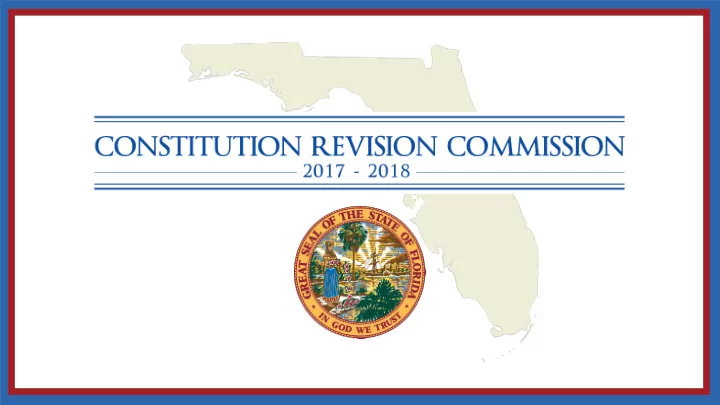

History of the CRC In 1968, Florida voters ratified three separate amendments rewriting significant portions of the Florida Constitution. These changes included requiring a CRC to convene every 20 years . • The 1977-1978 CRC was chaired by Sandy D’Alemberte and put eight proposals on the Florida ballot for voter consideration. None of the proposals passed but some were implemented later. • The 1997-1998 CRC, chaired by Dexter Douglass, put nine proposals on the Florida ballot for voter consideration. Eight were passed by Florida voters. • The 2017-2018 CRC was the third of its kind in Florida history and was chaired by Carlos Beruff. The Commission put eight proposals on the Florida ballot for voter consideration. flcrc.gov/About/History
CRC Timeline • The CRC submitted its final report to the Florida Secretary of State on May 9, 2018. • CRC proposals will appear as Amendments 6 through 13 on the General Election ballot. • All amendments must secure at least 60% voter approval to become law.
Public Hearings The CRC embarked on two statewide public hearing tours (15 total). More than 5,800 Floridians attended and more than 2,370 made their voices heard. Melbourne Fort. Lauderdale St. Petersburg Pensacola
CRC Committee Meetings • Committee meetings were held in Tallahassee from September 2017 – February 2018 to consider proposed constitutional revisions. • Individuals and subject matter experts from across Florida presented before committees. • Video recordings of all committee meetings are available on www.TheFloridaChannel.org.
CRC Floor Sessions • The CRC held multiple floor sessions throughout the duration of the Commission. • In 2017, the CRC held floor sessions to consider public proposals sponsored by Commissioners for committee review. • In 2018, the CRC held floor sessions to send proposals to the Style & Drafting Committee and to vote on final amendments for the ballot.
Amendment 7: First Responder and Military Member Survivor Benefits; Public Colleges and Universities Revision 2: Composed of CRC Proposals 49, 44 and 83 FIRST RESPONDER AND MILITARY MEMBER SURVIVOR BENEFITS; PUBLIC COLLEGES AND UNIVERSITIES. — Grants mandatory payment of death benefits and waiver of certain educational expenses to qualifying survivors of certain first responders and military members who die performing official duties. Requires supermajority votes by university trustees and state university system board of governors to raise or impose all legislatively authorized fees if law requires approval by those bodies. Establishes existing state college system as constitutional entity; provides governance structure.
Amendment 8: School Board Term Limits and Duties; Public Schools Revision 3: Composed of CRC Proposals 43, 71, and 10 SCHOOL BOARD TERM LIMITS AND DUTIES; PUBLIC SCHOOLS. — Creates a term limit of eight consecutive years for school board members and requires the legislature to provide for the promotion of civic literacy in public schools. Currently, district school boards have a constitutional duty to operate, control, and supervise all public schools. The amendment maintains a school board’s duties to public schools it establishes, but permits the state to operate, control, and supervise public schools not established by the school board.
Other Amendments • Amendment 6: RIGHTS OF CRIME VICTIMS; JUDGES. — Creates constitutional rights for victims of crime; requires courts to facilitate victims’ rights; authorizes victims to enforce their rights throughout criminal and juvenile justice processes. Requires judges and hearing officers to independently interpret statutes and rules rather than deferring to government agency’s interpretation. Raises mandatory retirement age of state justices and judges from seventy to seventy-five years; deletes authorization to complete judicial term if one-half of term has been served by retirement age. • Amendment 9: PROHIBITS OFFSHORE OIL AND GAS DRILLING; PROHIBITS VAPING IN ENCLOSED INDOOR WORKPLACES . — Prohibits drilling for the exploration or extraction of oil and natural gas beneath all state-owned waters between the mean high water line and the state’s outermost territorial boundaries. Adds use of vapor -generating electronic devices to current prohibition of tobacco smoking in enclosed indoor workplaces with exceptions; permits more restrictive local vapor ordinances.
• Amendment 10: STATE AND LOCAL GOVERNMENT STRUCTURE AND OPERATION . — Requires legislature to retain department of veterans’ affairs. Ensures election of sheriffs, property appraisers, supervisors of elections, tax collectors, and clerks of court in all counties; removes county charters’ ability to abolish, change term, transfer duties, or eliminate election of these offices. Changes annual legislative session commencement date in even-numbered years from March to January; removes legislature’s authorization to fix another date. Creates office of domestic security and counterterrorism within department of law enforcement. • Amendment 11: PROPERTY RIGHTS; REMOVAL OF OBSOLETE PROVISION; CRIMINAL STATUTES . — Removes discriminatory language related to real property rights. Removes obsolete language repealed by voters. Deletes provision that amendment of a criminal statute will not affect prosecution or penalties for a crime committed before the amendment; retains current provision allowing prosecution of a crime committed before the repeal of a criminal statute. • Amendment 13 : ENDS DOG RACING. — Phases out commercial dog racing in connection with wagering by 2020. Other gaming activities are not affected.
Recommend
More recommend